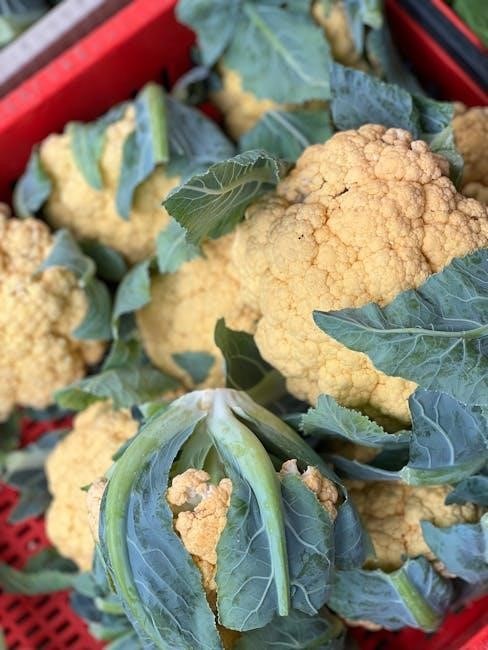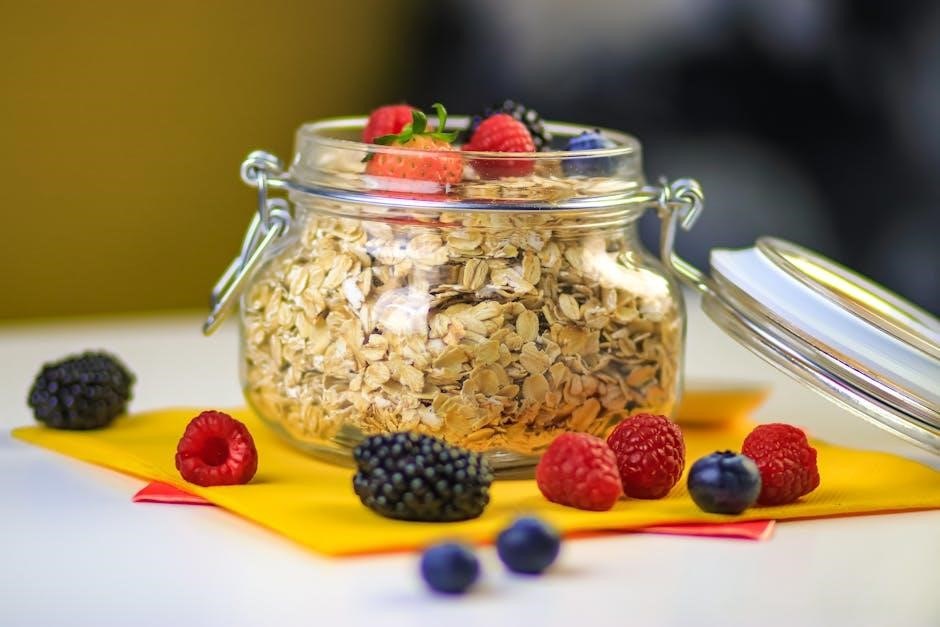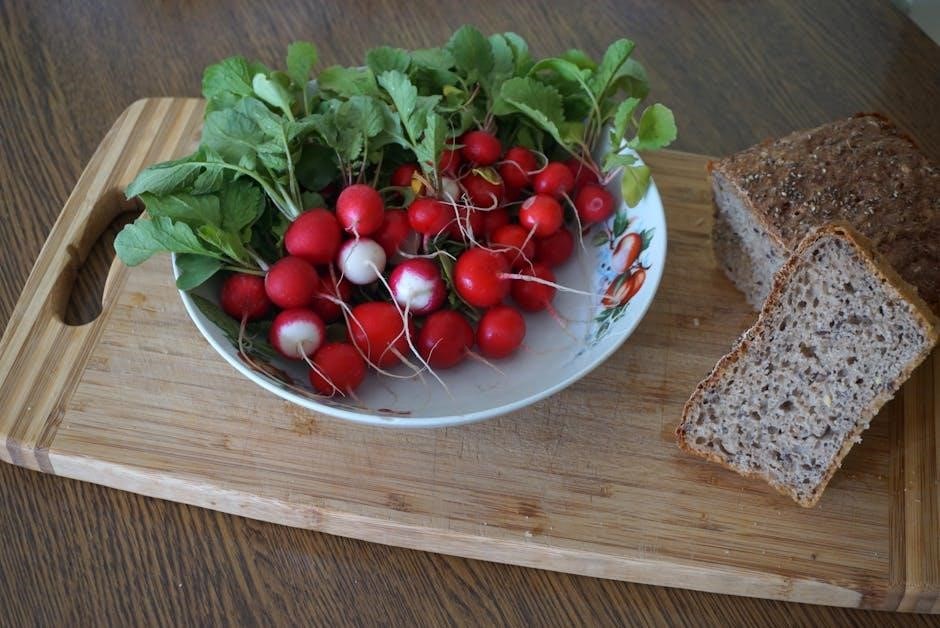
Discover a transformative 30-day journey focused on whole, plant-based foods․ This structured plan guides you through phases of nutritional and lifestyle changes, promoting balanced eating and long-term well-being․
1․1․ Overview of the Plan
The 30-day plant-based diet plan is a structured program designed to guide individuals toward a healthier lifestyle․ It focuses on incorporating whole, unprocessed foods like fruits, vegetables, grains, and legumes․ The plan is divided into five phases, each addressing specific nutritional and lifestyle goals․ It emphasizes balanced eating, reducing reliance on animal products, and promoting long-term well-being․ With meal ideas, shopping lists, and practical tips, this plan offers a comprehensive approach to adopting plant-based eating․ It’s suitable for beginners and those seeking to refresh their dietary habits, ensuring a smooth transition to a more sustainable and nutritious way of living․
1․2․ Benefits of a Plant-Based Diet
A plant-based diet offers numerous health benefits, including weight management, improved blood sugar control, and reduced heart disease risk․ It promotes higher energy levels, better digestion, and improved mental clarity․ By focusing on whole foods, this diet supports nutrient density, providing essential vitamins, minerals, and antioxidants; It also fosters a stronger connection to sustainable living, benefiting both personal health and the environment․ Many find that adopting this diet leads to long-term well-being and a reduced risk of chronic diseases, making it a powerful choice for overall health and vitality․

Key Components of the 30-Day Plant-Based Diet
Focuses on whole, unprocessed foods, emphasizing variety and nutrient-rich ingredients․ Includes protein sources, fruits, vegetables, and grains, ensuring balanced nutrition for optimal health and energy․
2․1․ Whole, Unprocessed Foods
Whole, unprocessed foods form the foundation of the 30-day plant-based diet plan․ These include vegetables, fruits, beans, lentils, nuts, seeds, and whole grains․ Emphasizing these foods ensures you avoid artificial additives and preservatives, promoting better digestion and nutrient absorption․ Incorporating a variety of colorful vegetables and fruits provides essential vitamins, minerals, and antioxidants․ Whole grains like quinoa, brown rice, and oats offer sustained energy and fiber․ Nuts and seeds add healthy fats and protein, while legumes are rich in protein and fiber․ This approach supports overall health, reduces inflammation, and helps maintain a balanced diet․ It also encourages mindful eating and long-term sustainability․
2․2․ Protein Sources in a Plant-Based Diet
A plant-based diet offers a variety of protein-rich foods, ensuring you meet your nutritional needs․ Legumes like beans, lentils, and chickpeas are excellent sources, along with tofu, tempeh, and edamame․ Whole grains such as quinoa and farro also provide protein․ Nuts, seeds, and nut butter are convenient options, while seitan and meat alternatives can add variety․ These foods are rich in essential amino acids and fiber, making them healthier alternatives to animal-based proteins․ Incorporating these into your meals ensures a balanced and satisfying diet, supporting muscle health and overall well-being throughout your 30-day plan․
2․3․ Incorporating Fruits, Vegetables, and Grains
Fruits, vegetables, and whole grains form the backbone of a vibrant plant-based diet․ Aim to include a variety of colorful vegetables in meals for essential vitamins and antioxidants․ Fruits add natural sweetness and fiber, while whole grains like quinoa, brown rice, and oats provide sustained energy․ Incorporate leafy greens, berries, and cruciferous vegetables for maximum nutrient density․ Pair these with whole grains to create balanced meals that support overall health and satisfaction․ This combination ensures a diverse intake of vitamins, minerals, and fiber, keeping you energized and nourished throughout the day․

Phases of the 30-Day Transformation Program
Phase 1 lasts 5 days and focuses on introducing simple, whole-food meals․ It helps participants transition smoothly by incorporating plant-based staples like fruits, vegetables, and whole grains․ The goal is to reset taste buds and build a foundation for the diet․ Meals are designed to be easy to prepare, with tips for replacing animal products with plant-based alternatives․ This phase emphasizes hydration, portion control, and understanding basic nutrition principles․ By the end of Phase 1, participants should feel more comfortable with plant-based eating and ready to progress to the next stage of the program․
3․2․ Phase 2: Increasing Nutrient Density
Phase 2 builds on the foundation of Phase 1 by focusing on nutrient-dense foods to enhance health benefits․ Participants incorporate superfoods, dark leafy greens, and legumes into their meals, ensuring a variety of textures and flavors․ This phase introduces strategies for meal planning, hydration, and portion control to optimize nutrition․ The goal is to increase energy levels and support overall well-being through balanced plant-based eating․ Practical tips and creative recipes help participants transition smoothly and maintain motivation throughout this critical phase․
3․3․ Phase 3: Balancing Macronutrients
Phase 3 emphasizes balancing carbohydrates, proteins, and fats to ensure sustained energy and satisfaction․ Participants learn to pair whole grains with legumes, nuts, and seeds for complete meals․ This phase focuses on understanding portion sizes and the importance of variety in achieving macronutrient harmony․ Tips include incorporating healthy fats like avocados and nuts, while maintaining a colorful plate of vegetables to maximize nutrient intake․ Practical meal templates and recipes help participants master the art of balanced plant-based eating, supporting long-term health and vitality․
3․4․ Phase 4: Advanced Meal Planning
Phase 4 focuses on refining meal planning skills for long-term success․ Participants learn advanced strategies like meal prepping, batch cooking, and grocery shopping optimization․ This phase introduces techniques to incorporate variety and ensure meals remain exciting and nutritious․ Tips include creating a weekly meal calendar, swapping ingredients for customization, and utilizing leftovers creatively․ Emphasis is placed on balancing flavors and textures to keep meals satisfying․ By mastering these skills, individuals can maintain a balanced, plant-based diet with ease and confidence, setting the stage for sustainable lifestyle changes beyond the 30-day program․
3․5․ Phase 5: Sustaining Long-Term Changes
Phase 5 emphasizes maintaining the plant-based lifestyle beyond the initial 30 days․ Strategies include setting realistic goals, building a support network, and staying informed about new recipes and nutritional insights․ Participants are encouraged to track progress and reflect on their journey․ This phase also focuses on overcoming common challenges and celebrating milestones․ By integrating healthy habits into daily routines, individuals can ensure lasting changes, fostering a deeper commitment to their well-being and the environment․ The goal is to make plant-based eating a sustainable, enjoyable part of life․
Sample 7-Day Meal Plan
Explore a week of balanced plant-based meals, featuring breakfasts like apple cinnamon oatmeal, lunches with quinoa salads, and hearty dinners such as lentil curries or stir-fries, ensuring variety and nutrition․
4․1․ Day 1: Breakfast, Lunch, and Dinner Ideas
Start your day with a hearty Apple Cinnamon Oatmeal, topped with fresh fruit and a sprinkle of nuts․ For lunch, enjoy a vibrant Quinoa Salad with mixed greens, cherry tomatoes, and a citrus vinaigrette․ Dinner features a flavorful Lentil Curry served over brown rice, alongside steamed broccoli․ These meals are designed to be nutritious, satisfying, and easy to prepare, setting a delicious tone for your plant-based journey․
4․2․ Day 2: Incorporating Variety in Meals
Begin Day 2 with a refreshing Chia Pudding topped with berries and granola․ For lunch, try a Couscous Salad with roasted vegetables, chickpeas, and a zesty lemon-tahini dressing․ Dinner features a hearty Pasta Marinara with sautéed spinach and a side of steamed asparagus․ This day emphasizes variety, introducing new textures and flavors while maintaining nutritional balance․ A midday snack of Apple Slices with Almond Butter keeps energy levels steady․ These meals showcase the diversity of plant-based eating, ensuring satisfaction and nourishment throughout the day․

Weekly Shopping List
Stock up on whole grains, legumes, fresh fruits, vegetables, nuts, seeds, and healthy oils․ Include quinoa, brown rice, lentils, chickpeas, and a variety of colorful produce for balanced meals․
5․1․ Essential Grocery Items
For a successful 30-day plant-based diet, start with essential items like whole grains (quinoa, brown rice, oats), legumes (lentils, chickpeas, black beans), and a variety of fruits and vegetables․ Include nuts and seeds for healthy fats, such as almonds, chia seeds, and flaxseeds․ Don’t forget plant-based milk alternatives like almond or oat milk․ Incorporate herbs and spices to enhance flavor without added salt or sugar․ Healthy oils like olive and avocado oil are also crucial for cooking․ These staples will form the foundation of your meals throughout the month․
5․2․ Pantry Staples for Plant-Based Cooking
Stock your pantry with versatile staples like whole grains (oats, quinoa, brown rice), canned beans (black beans, chickpeas), and tomatoes for sauces․ Include nut butters (peanut butter, almond butter) and tahini for creamy textures․ Vinegars (apple cider, balsamic) and oils (olive, avocado) add flavor to dishes․ Spices like cumin, turmeric, and paprika enhance meals without salt or sugar․ Dried herbs, seaweed, and nutritional yeast are great for adding depth․ Plant-based milks, such as oat or almond milk, are essential for smoothies and cereals․ These staples will help you create diverse, nutritious, and flavorful plant-based meals throughout your 30-day plan․
Common Challenges and Solutions
Address challenges like cravings and hunger with meal prepping and hydration․ Stay motivated by tracking progress and celebrating small victories to maintain commitment throughout the 30 days․
6․1․ Managing Cravings and Hunger
Cravings and hunger can be challenging when transitioning to a plant-based diet․ Stay prepared with healthy snacks like nuts, seeds, and fruits․ Incorporate protein- and fiber-rich foods to keep energy levels steady․ Meal prepping helps ensure you always have nutritious options available․ Drinking plenty of water and herbal teas can reduce hunger pangs․ Substitute cravings for unhealthy snacks with whole, nutrient-dense alternatives like roasted vegetables or hummus․ Plan balanced meals that include a variety of flavors and textures to stay satisfied and reduce the urge to overeat or indulge in non-compliant foods․
6․2․ Staying Motivated Throughout the 30 Days
Staying motivated during a 30-day plant-based diet requires focus and accountability․ Set clear, achievable goals and track your progress daily․ Share your journey with friends or join a support group for encouragement․ Celebrate small milestones, like completing a week, to stay inspired․ Keep a journal to document how you feel physically and mentally․ Remind yourself of the benefits, such as improved health and energy․ Plan exciting, new recipes to avoid boredom and maintain variety․ Reward yourself with non-food treats, like a relaxing bath or a fun activity, to stay committed to your transformation․

Tips for Success
- Plan meals in advance to avoid last-minute decisions․
- Stay hydrated with water and plant-based drinks․
- Explore new recipes to keep meals exciting․
- Track progress to stay motivated and accountable․
7․1․ Meal Prepping Strategies
Meal prepping is essential for staying consistent with your plant-based diet․ Start by planning your meals for the week, ensuring variety and nutrient balance․ Dedicate one day to batch cooking, such as roasting vegetables, preparing grains, and making legume-based dishes․ Use airtight containers to store prepped meals, keeping them fresh for up to 5 days․ Chop fruits and veggies in advance for quick snacks or salads․ Organize your pantry and fridge to easily access ingredients, saving time during meal assembly․ This strategy helps reduce food waste, saves time, and keeps you committed to your dietary goals throughout the 30-day plan․
7․2․ Staying Hydrated and Energetic
Staying hydrated and maintaining energy levels is crucial during your 30-day plant-based journey․ Begin each day with a glass of water or herbal tea․ Incorporate water-rich foods like cucumbers, melons, and celery into meals․ Coconut water and plant-based milks can also contribute to hydration․ For energy, balance your macronutrients by including whole grains, nuts, and seeds in your diet․ Eat smaller, frequent meals to maintain steady energy levels․ Limit processed foods and caffeine, which can cause energy crashes․ Additionally, consider incorporating electrolyte-rich beverages like coconut water or banana-based smoothies to stay energized and hydrated throughout the day․
Embrace the transformative power of a 30-day plant-based diet․ This structured plan offers a pathway to improved nutrition, energy, and overall well-being, empowering you for long-term commitment․
8․1․ Final Thoughts on the 30-Day Plan
Completing a 30-day plant-based diet plan is a significant achievement, offering profound benefits for health, energy, and overall well-being․ This structured program guides participants through a transformative journey, emphasizing whole, unprocessed foods and balanced nutrition․ By following the outlined phases and meal plans, individuals can develop sustainable eating habits and a deeper appreciation for plant-based cuisine․ The plan’s flexibility and focus on variety ensure it’s accessible and enjoyable, even for those new to this dietary approach․ Celebrate your commitment to health and use this foundation to continue nurturing your body and mind․
8․2․ Encouragement for Long-Term Adoption
Embracing a plant-based lifestyle is a powerful step toward lasting health and well-being․ Beyond the 30-day plan, focus on maintaining balanced, nutrient-dense meals and exploring new recipes․ Celebrate small victories, like increased energy or improved digestion, and remind yourself of the broader benefits, such as supporting environmental sustainability․ Stay connected with like-minded individuals for motivation and share your journey to inspire others․ Remember, consistency is key, and every plant-based choice brings you closer to long-term wellness․ Keep nurturing your body and mind—you’ve already taken the first steps toward a healthier, more vibrant life․